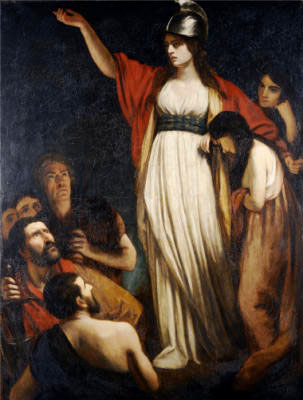
Larina was an Italian Amazon who accompanied Camilla in the Aeneid along with fellow comrades-in-arms, Tulia, Acca, and Tarpeia. According to Silver Latinist poet Virgil, “they were like Thracian Amazons when they make the waters of Thermodon tremble and make war with their ornate arms, either around Hippolyte or when warlike Penthesilea returns in her chariot and the female armies exult, with a great ringing cry and the clashing of crescent-shaped shield.”
Rhodogune, queen of ancient Parthia in 200 B.C., got word of a revolt when she was taking a bath. Vowing to end the uprising before her hair was dressed, she hopped on her horse and rushed to lead her army to defense. True to her word, she directed the entire, lengthy war without ever bathing, or combing her hair. Portraits of Rhodogune always faithfully depict her dishevelment. (Another queen of the ancient world, Semiramis, also pulled herself from the bath to the battlefield act when her country needed a brave leader.)
Of the royal lineage of Cleopatra, Zenobia Septimus preferred the hunt to the bath and boudoir. She was queen of Syria for a quarter-century beginning in 250 A.D. and was quite a scholar, recording the history of her nation. She was famed for her excellence on safari, specializing in the rarified skill of hunting panthers and lions.
When the Romans came after Syria, Zenobia disgraced the empire’s army in battle, causing them to turn tail and run. This inspired Arabia, Armencia, and Periso to ally with her and she was named Mistress of Nations. The Romans licked their wounds and enlisted the help of the barbarians they conquered for a Roman army including Goths, Gauls, Vandals, and Franks who threatened to march Zenobia’s league of nations. When Caesar Aurelius sent messengers requesting her surrender, she replied, “It is only by arms that the submission you require can be achieved. You forget that Cleopatra preferred death to servitude. When you see me in war, you will repent your insolent proposition.” And battle they did. Zenobia fought bravely, holding her city Palmyria against the mass of invaders for longer than anyone thought possible. Upon her capture, Zenobia was taken to Rome in chains, jewels, and her own chariot, and she was given her own villa in Rome where her daughters intermarried into prominent families who ruled Rome.

Boudicca’s name means “victorious” in the language of the Celts. She is the legendary warrior-queen of the Iceni of Norfolk who led a rebellion against the invading Romans in the year 61 A.D., and sacked the Roman’s settlements including Verulamium and Londinium, which she put to the torch. She took the lives of 70,000 Romans in her battles and was reputed to be “tall of person, of a comely appearance, and appareled in a loose gown of many colors. About her neck she wore a chain of gold and in her hand she bore a spear. She stood a while surveying her army and, being regarded with a reverential silence, she addressed them an eloquent and impassioned speech.” She died in battle, at her own hand, taking poison rather than be killed by an enemy of the Celts. Many women fought to defend their land and culture; the Celtic army consisted of more women than men!
This excerpt is from The Book of Awesome Women by Becca Anderson, which is available now through Amazon and Mango Media.


